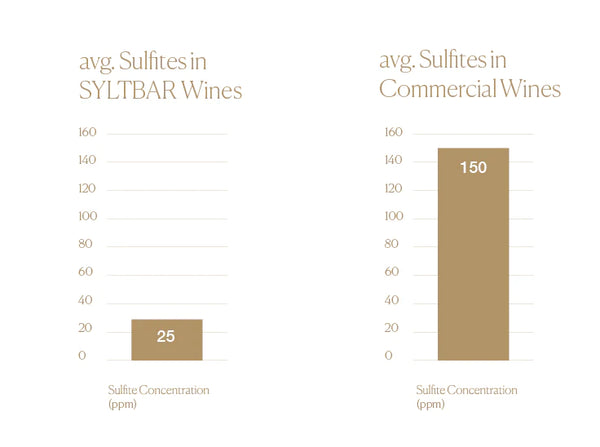Attention all wine enthusiasts that have a sensitivity to sulfites: we have some great news for you. You can still enjoy wine without having to deal with the negative side effects of excessive sulfites. At SYLTBAR, we feel it is our duty to help educate consumers to help them make informed choices about the type of wine they are purchasing and drinking — informed choices that suit their preferences and health.
Understanding Sulfites
Sulfites, or sulfur dioxide (SO2), are compounds naturally present in grapes and wine, serving as a preservative that prevents spoilage and oxidation. Sulfites act as a preservative, preventing the growth of unwanted bacteria and yeasts that could spoil the wine. Sulfites also help protect wine from oxidation, preserving its color, flavor, and aroma. All of this also contributes to the stability of the wine during any transportation and storage time during the distribution and selling process.
If you ever see a brand that touts the benefit of being sulfite free wine, the juice has probably been tampered with chemically. The only way to completely rid a wine of its natural sulfites would be to add some kind of chemical that clears them out. A low level of natural sulfites is always going to be present in the wine, and this typically doesn’t cause side effects for those who are sensitive to sulfites. It’s when winemakers decide to add extra sulfites during the winemaking process that people may feel the aftereffects.

For comparison, the average amount of sulfites in commercial wines is about 150 ppm (parts per million), but SYLTBAR wines contain only 25 ppm — and those are naturally occurring. Our producers will never add sulfites to their wines.
Pros and Cons of Added Sulfites
Many winemakers choose to add sulfites for various reasons, mainly with the goal to help with wider distribution. In addition to wider distribution, it is also about saving money when producing in larger quantities. Really large quantities require much more sulfites. You have to know over 50% of all wines sold in the U.S. are made by just 3 large corporations. These wines also have more sulfites, high sugar and alcohol levels.
All wines are regulated by the Alcohol and Tobacco Tax and Trade Bureau (the "TTB"), and not the FDA, what should in our opinion the FDA, but we are not making the rules here. Wines are NOT required to list their ingredients on the label. Which means bottles of wine don’t even have to show (even expensive, highly rated wines) can contain up to 72 “allowed” additives.
Added sulfites enable the wines to be shipped and distributed to stores and restaurants all over the world. Additionally, those extra sulfites ensure a longer shelf life for the wines, which means stores and restaurants can keep the bottles on hand for longer periods of time.
Ever wonder why you don’t see SYLTBAR in every wine retail shop or grocery store, or in other countries? This is the reason. Our producers care more about quality than quantity. Every increase in sales requires a very detailed forecast because of the controlled vineyard. Therefore, SYLTBAR grows very steadily and every new state or country needs at least 6 month preparation to ensure the wines have the same quality with the growth. One time we had to close our wine club because of the this demand. If you look on the back label of a bottle of SYLTBAR, you will always find the fill date. This shows that our wines are not part of a mass production process. By the way, we are the only wine producer in the US who is so transparent. There is no other brand that shows a filling date for Prosecco — there is a reason for this!
There is a lot of talk about sulfite free wine because people tend to attribute certain adverse reactions to the presence of added sulfites in wine. Some individuals may experience symptoms ranging from headaches and respiratory issues to inflammation or irritation of the skin. Excessive sulfites can also mask the natural flavors of the wine, affecting its overall profile and thus, disrupting your true wine tasting experience.

Wine Shopping with a Sulfite Sensitivity
While sulfite sensitivity is not too common, we know that there are individuals who may be more prone to experiencing these unfavorable symptoms. Factors such as asthma or allergies to sulfur-containing compounds can increase sensitivity. It's essential for those with known sensitivities to choose wines with lower sulfite levels and wines with absolutely no added sulfites — like SYLTBAR.
Choosing the right wine when you have a sensitivity to sulfites involves understanding the role of sulfites in winemaking, being mindful of your own personal sensitivities, and recognizing that the majority of the US wines are created with the same production process. Now that you know that our winery never add sulfites to their wines, you can confidently navigate the wine aisle (or the Internet) and select an option that will align with both your palate and well-being.
On top of that, you can read about it for yourself! We have over 1,653 reviews — and that means you don’t have to take our words for granted. SYLTBAR’s low sulfite wines are available online at syltbar.com, or you can use our store locator to search for a retailer near you that sells our brand.







